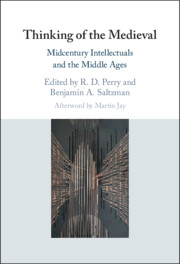Book contents
- Thinking of the Medieval
- Thinking of the Medieval
- Copyright page
- Dedication
- Contents
- Contributors
- Acknowledgments
- About the Cover
- Introduction
- Part I Politics
- Part II Arts
- Chapter 5 Curtius and Jung
- Chapter 6 Old English at the Midcentury
- Chapter 7 Erwin Panofsky’s Neo-Kantian Humanism and the Purported Relation between Gothic Architecture and Scholasticism
- Chapter 8 “Are Women Human?”
- Part III Epochs
- Bibliography
- Index
Chapter 6 - Old English at the Midcentury
Poetry, Scholarship, and Fiction in Britain in the 1940s and 1950s
from Part II - Arts
Published online by Cambridge University Press: 07 October 2022
- Thinking of the Medieval
- Thinking of the Medieval
- Copyright page
- Dedication
- Contents
- Contributors
- Acknowledgments
- About the Cover
- Introduction
- Part I Politics
- Part II Arts
- Chapter 5 Curtius and Jung
- Chapter 6 Old English at the Midcentury
- Chapter 7 Erwin Panofsky’s Neo-Kantian Humanism and the Purported Relation between Gothic Architecture and Scholasticism
- Chapter 8 “Are Women Human?”
- Part III Epochs
- Bibliography
- Index
Summary
Literary practice is a distinctive form of historical thinking and early medieval culture is an important component of literary creativity and innovation in the 1940s and 1950s. This chapter examines the opportunities early medieval English poetry afforded writers and scholars in Britain in the 1940s and 1950s. Modern writers in this period negotiated the medieval past in their work in different ways. Outright hostility sits alongside an awareness that thinking of the medieval is a necessary component of modern culture. To give a sense of this literary engagement, this chapter offers an account of Old English at the mid-century in relation to four profoundly different writers, Kingsley Amis (1922–1995), Gavin Bone (1907–1942), Bryher (Annie Winifred Ellerman, 1894–1983), and Angus Wilson (1913–1991). The work of these writers and scholars demonstrates that early medieval culture is part of a broader post-War inquiry into society, culture, sexuality, race and ethnocentrism.
- Type
- Chapter
- Information
- Thinking of the MedievalMidcentury Intellectuals and the Middle Ages, pp. 147 - 166Publisher: Cambridge University PressPrint publication year: 2022



